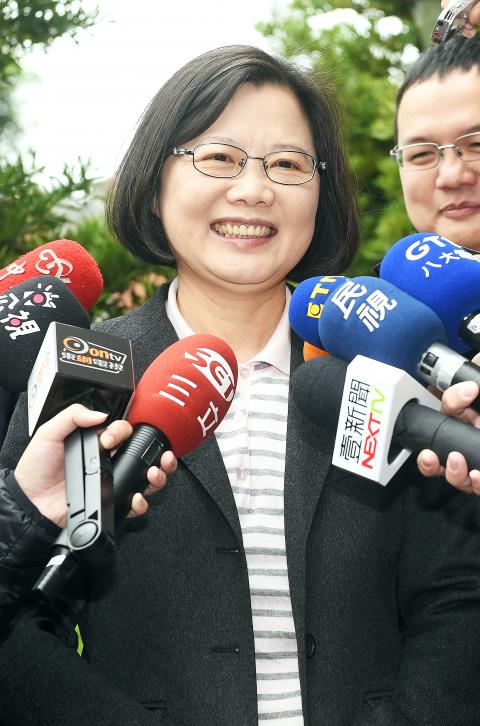Democratic Progressive Party (DPP) Chairperson and presidential candidate Tsai Ing-wen (蔡英文) yesterday said that keeping cross-strait relations stable is a shared objective, adding that all concerned parties should sit and negotiate a solution acceptable to all involved.
“I can feel that everyone is concerned about how the DPP — and I — will handle China affairs. We are working hard to take care of the issue, hoping to maintain cross-strait stability and peace under very complicated circumstances, while defending Taiwan’s interests at the same time, and allow Taiwanese to have more options,” Tsai said. “We want to do it well, and it needs time, and we have been in good communication with different parties.”
Tsai made the remarks in response to reporters’ questions about comments made on Friday at a conference on cross-strait relations hosted by the Heritage Foundation in Washington by former American Institute in Taiwan (AIT) managing director Barbara Schrage.

Photo: Chien Jung-fong, Taipei Times
Schrage reportedly said that Tsai was unable to clarify Washington’s doubts about her China policy when she visited the US in September 2011 as the DPP’s candidate for the 2012 presidential election, and urged Tsai to present something new that would ease the concerns of China and the US.
Tsai — who is expected to be her party’s candidate in next year’s presidential election — is expected to have a chance to elucidate her stance in a visit to Washington set for later this year, Schrage said, adding that if Tsai cannot present something new, she would not be able to pass the test easily.
Schrage retired in January last year from the position she had held since 2006.
Asked if she considers Schrage’s remarks as US interference with Taiwan’s election, Tsai yesterday reaffirmed that she believes that the US will remain neutral, since it “has repeatedly stressed that it would not interfere in our election.”
Tsai said that stability and peace in cross-strait relations is beneficial to all parties and thus everyone should work together to find a solution that is acceptable to all and beneficial to the people of Taiwan.
“Rather than saying it is intervention or influencing, I suggest that we all sit down and talk,” Tsai said.

AIR SUPPORT: The Ministry of National Defense thanked the US for the delivery, adding that it was an indicator of the White House’s commitment to the Taiwan Relations Act Deputy Minister of National Defense Po Horng-huei (柏鴻輝) and Representative to the US Alexander Yui on Friday attended a delivery ceremony for the first of Taiwan’s long-awaited 66 F-16C/D Block 70 jets at a Lockheed Martin Corp factory in Greenville, South Carolina. “We are so proud to be the global home of the F-16 and to support Taiwan’s air defense capabilities,” US Representative William Timmons wrote on X, alongside a photograph of Taiwanese and US officials at the event. The F-16C/D Block 70 jets Taiwan ordered have the same capabilities as aircraft that had been upgraded to F-16Vs. The batch of Lockheed Martin

US President Donald Trump yesterday announced sweeping "reciprocal tariffs" on US trading partners, including a 32 percent tax on goods from Taiwan that is set to take effect on Wednesday. At a Rose Garden event, Trump declared a 10 percent baseline tax on imports from all countries, with the White House saying it would take effect on Saturday. Countries with larger trade surpluses with the US would face higher duties beginning on Wednesday, including Taiwan (32 percent), China (34 percent), Japan (24 percent), South Korea (25 percent), Vietnam (46 percent) and Thailand (36 percent). Canada and Mexico, the two largest US trading

GRIDLOCK: The National Fire Agency’s Special Search and Rescue team is on standby to travel to the countries to help out with the rescue effort A powerful earthquake rocked Myanmar and neighboring Thailand yesterday, killing at least three people in Bangkok and burying dozens when a high-rise building under construction collapsed. Footage shared on social media from Myanmar’s second-largest city showed widespread destruction, raising fears that many were trapped under the rubble or killed. The magnitude 7.7 earthquake, with an epicenter near Mandalay in Myanmar, struck at midday and was followed by a strong magnitude 6.4 aftershock. The extent of death, injury and destruction — especially in Myanmar, which is embroiled in a civil war and where information is tightly controlled at the best of times —

China's military today said it began joint army, navy and rocket force exercises around Taiwan to "serve as a stern warning and powerful deterrent against Taiwanese independence," calling President William Lai (賴清德) a "parasite." The exercises come after Lai called Beijing a "foreign hostile force" last month. More than 10 Chinese military ships approached close to Taiwan's 24 nautical mile (44.4km) contiguous zone this morning and Taiwan sent its own warships to respond, two senior Taiwanese officials said. Taiwan has not yet detected any live fire by the Chinese military so far, one of the officials said. The drills took place after US Secretary